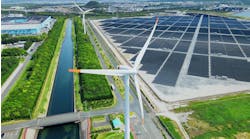Siemens Financial Services (SFS) has released a new white paper titled, “Financing Decarbonization: Smart Buildings,” which seeks to estimate the "investment gap" between current levels of investment in renovating office, hospital and education sites, and the actual level of investment required to meet updated decarbonization targets by 2050.
Part of a series of white papers on ways to finance decarbonization, the research focuses on buildings — which SFS estimates account for 36% of overall energy use -- as a locus for energy efficiency initiatives, and a major potential way of achieving goals related to climate change.
The paper notes that in order to shorten the gap between current investment levels and required volumes, smart financing methods are being now offered by private sector investors. Such methods seek to make the conversion to decarbonized, energy-efficient, smart buildings affordable for owners.
The paper notes that the right financing can ease cash flow and align costs to the rate of benefits gained, and that smart financing also has the potential to make the transition to decarbonization budget-neutral, by in effect yielding future savings to pay for current investment.
“Our use of buildings has been disrupted and altered by the pandemic,” observed Jo Harris, sales director, commercial finance UK, SFS. “Not only can smarter building stock better cope with this change, it will contribute significantly to a cleaner and greener future. Smart financing solutions can accelerate the rate of transformation, helping buildings owners to achieve net-zero carbon building stock by 2050."
The study finds that smart buildings that incorporate hot-desking, health and safety, information access controls, security, infection mitigation, and other mitigation factors will be best-positioned to ensure more efficient use of commercial and public buildings, as well as significantly reduced energy usage and emissions -- and the transformation of buildings into sustainable assets for society.


